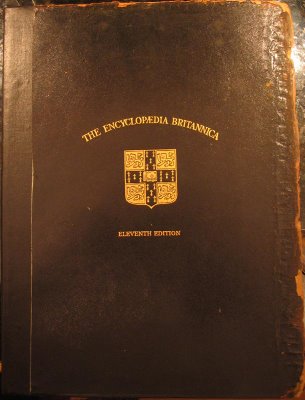There is no article on homosexuality; Volume 13 skips from HOMOEOPATHY to HOMONYM [sic]. Nothing on sodomy, either. I pull out Volume 28 — which is missing its front cover and comes apart entirely in the middle of the article on Queen Victoria — to look up Oscar Wilde. The article says his plays "were perhaps the most original contributions to English dramatic writing during the period," but also mentions "fatal revelations as the result of his bringing a libel action against the marquis of Queensberry." Without further explanation, the article says Wilde "was sentenced to two years' imprisonment with hard labour for offences under the Criminal Law Amendment Act," It adds: "Even after leaving prison he was necessarily an outcast from decent circles, and he lived mainly on the Continent, under the name 'Sebastian Melmoth.' " The article, I discover, was written by Hugh Chisholm, the 11th edition's much respected editor.
 This caught my attention because we have our own copy of this excellent encyclopedia right here chez Ionarts. Mrs. Ionarts' father was a professor of history and a widely read intellectual interested in chess, literature (my Moncrieff translation of Proust belonged to him), opera. He was obsessed with the Beethoven recordings of Artur Schnabel and with the paintings of Vermeer (Mrs. Ionarts remembers falling asleep on the floor of the Louvre while her dad spent hours going over a Vermeer canvas with a magnifying glass.) It is one of the great sadnesses of my life not to have been able to meet him, as he died before she and I met. He bought his copy of the 1911 Brittanica because, as he put it, it represented a snapshot of the world's knowledge, in a complete and beautifully written form, before the devastation of the two world wars changed humanity forever.
This caught my attention because we have our own copy of this excellent encyclopedia right here chez Ionarts. Mrs. Ionarts' father was a professor of history and a widely read intellectual interested in chess, literature (my Moncrieff translation of Proust belonged to him), opera. He was obsessed with the Beethoven recordings of Artur Schnabel and with the paintings of Vermeer (Mrs. Ionarts remembers falling asleep on the floor of the Louvre while her dad spent hours going over a Vermeer canvas with a magnifying glass.) It is one of the great sadnesses of my life not to have been able to meet him, as he died before she and I met. He bought his copy of the 1911 Brittanica because, as he put it, it represented a snapshot of the world's knowledge, in a complete and beautifully written form, before the devastation of the two world wars changed humanity forever.Here are a few excerpts from an article of interest to Ionarts readers, "Opera" by none other than Donald Francis Tovey. The description of the intellectual Florentine Camerata's experiments that led to the genre we know as opera is too wonderful:
The first pioneer in the new "monodic" movement seems to have been Vincenzo Galilei, the father of Galileo. This enthusiastic amateur warbled the story of Ugolino to the accompaniment of the lute, much to the amusement of expert musicians; but he gained the respect and sympathy of those whose culture was literary rather than musical. His efforts must have been not unlike a wild caricature of Mr. W. B. Yeats's method of reciting poetry to the psaltery.Tovey has a lengthy discussion of Wagner's operas, from several different perspectives. He refers briefly to a few operas in the first decade of the 20th century, Debussy's Pelléas et Mélisande, Strauss's Salome and Elektra. Here is how Tovey views the future after 1911, in his final paragraph:
It remains to be seen whether a further development of Wagnerian opera, in the sense of addition to Wagner's resources in musical architecture, is possible. The uncompromising realism of Strauss does not at first sight seem encouraging in this direction; yet his treatment of Elektra's first invocation of Agamemnon produces a powerful effect of musical form, dimly perceived, but on a larger scale than even the huge sequences of Wagner. In any case, the best thing that can happen in a period of musical transition is that the leading revolutionaries should make a mark in opera. Musical revolutions are too easy to mean much by themselves; there is no purely musical means of testing the sanity of the revolutionaries or of the critics. But the stage, while boundlessly tolerant of bad music, will stand no nonsense in dramatic movement. [...] In every period of musical fermenation the art of opera has instantly sifted the men of real ideas from the aesthetes and doctrinaires: Monteverde [sic] from the prince of Venosa, Gluck from Gossec, Wagner from Liszt. As the ferment subsides, opera tends to a complacent decadence; but it will always revive to put to the first and most crucial test every revolutionary principle that enters into music to destroy and expand.There is no entry for either Stravinsky or Picasso. Next in this series of brief quotations from music and arts articles in the 11th edition of Encyclopædia Brittanica, Claude Debussy and Richard Strauss.
No comments:
Post a Comment